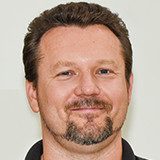
Sep. 13, 2017
Dr. Elizabeth King recently awarded National Science Foundation grant
Drs. Troy Zars and Elizabeth King, in the Division of Biological Sciences, were recently awarded a $462,900 National Science Foundation grant! This grant will be providing funding for a project which will focus on how genes underlie variation in learning and memory performance in fruit flies. Additionally, this grant will support an outreach program called Stepping Into Science. Stepping Into Science aims to diversify the scientific pipeline by partnering high school students with MU graduate students. Stepping Into Science was founded by Patricka Williams-Simon, a graduate student who is being co-mentored by Zars and King. Read more:https://www.eurekalert.org/pub_releases/2017-06/uom-mrr060517.php

Sep. 12, 2017
Data Mining for Genetic Combinations Relevant to Autism Subtypes
Autism is characterized by a complex set of behavioral, social, and cognitive deficits. Extensive variation of these phenotypes suggests the existence of autism subtypes that likely have distinct genetic etiologies. The lack of unifying genotypes common to autism patients supports this subtype structure, and suggests that the onset of autism is due to combinations of genetic factors. The ability to precisely diagnose autism subtypes using genetic markers would lead to earlier and more specific treatments and improve outcomes, stressing the need for research which increases our understanding of the genetic etiologies of autism subtypes. In this research, we identify combinations…

Sep. 5, 2017
Analysis of Influence of Additional Diagnostic Clues During Pathology Diagnosis
Traditional pathology diagnostic process routinely relies on disease-specific diagnostic clues. We propose an informatics pipeline to identify and quantify additional diagnostic clues that, in addition to traditional disease-specific clues, can improve diagnostic outcomes and decrease the chance of diagnostic pitfalls. We used our PathEdEx whole-slide imaging platform to record user activities related to diagnosing a cancerous tissue slide along with the biological features that were noted in the tissue by the examining pathologist as relevant to the diagnosis. To identify and quantify additional diagnostic clues that can improve diagnosis, we extended association rule mining techniques to measure information gain of the additional…

Aug. 11, 2017
A Blockchain Platform for Healthcare
Although Blockchain is much more investigated within the financial sector, it is gradually edging into other industries such as healthcare. Blockchain provides a trust mechanism in a cyber-system. Various last mile issues left to be resolved for establishing an end to end trust cyber physical system. This talk will discuss various aspects of blockchain last mile issues applied in the medical area. Especially, for data integrity, trust and secure data sharing technology specially fit for precision medicine supporting patient centric healthcare model. This is an international collaboration project among Asia University, Taiwan, China Medical University Hospital, Taiwan, University of Missouri,…

July 27, 2017
J. Chris Pires Celebrated for Research Contributions
J. Chris Pires , a Professor in the Division of Biological Sciences, was selected for the 2017 Chancellor’s Award for Outstanding Research and Creative Activity. The award is given once a year to a professor who has made outstanding contributions in research and has great promise for achieving wider recognition. It is one of the highest research honors bestowed by the MU campus. Read more:

July 25, 2017
Shi-Jie Chen receives his second concurrent NIH R01 award.
Shi-Jie Chen recieved an NIH R01 award entitled: “New computational tools for predicting ion effects in RNR structures” for four years with approximately $1.2M budget. The grant is to develop new algorithm, database, software and web server for metal ion binding to nucleic acids especially RNA molecures. The bioinformatics grant was reviewed in the Biodata Management and Analysis (BDMA) study section. Dr. Xiao Heng is the co-I of this grant.

July 13, 2017
MUII Dissertation Defense-Awatef Ben Ramadan
Steps in Transforming the Missouri Cancer Registry (MCR) from an Incidence Registry to a Survival Registry Female Breast cancer (FBC) is the most common invasive cancer among women of all races and ethnicities in the United States (US). We aimed to estimate FBC burden in Missouri in terms of FBC incidence, mortality and survival rates; to visualize these results; and to assess the usability of the Missouri Cancer Registry and Research Center’s (MCR-ARC)’s interactive maps. FBC survival data were calculated from 2004 to 2010 after matching MCR’s FBC cases with Missouri death records, Social Security Death Index (SSDI),…

June 1, 2017
MUII Dissertation Defense-Lynsey Whitacre
Alternative Applications of Whole Genome De Novo Assembly in Animal Genomics Improvements in whole genome sequencing technologies have allowed substantial increases in the amount of data that can be generated on a single individual. This has facilitated many de novo genome assembly projects in the animal sciences. The overarching goal of de novo assembly is to overlap sequencing reads to construct contiguous sequences, also known as contigs or scaffolds, representing the genome. Once a high quality de novo assembly is constructed, it is often used to determine variation in the genome or simply as a reference for future resequencing projects.

May 9, 2017
MUII Dissertation Defense- Rhonda Archie
Information Technology (IT) Interconnectivity in a Rural Health Setting: A Conceptual Model Current and past developments in Health (HIT) systems in rural settings have focused on the use of electronic health records by health professionals. These systems were conducted in standalone mode, or coupled with the integration of HIT systems of two or more other HIT systems. In addition, this lack of interconnectivity involved diminished coordination in information sharing among the systems (Bahensky 2008; McCullough 2009). Grossman (2006) and Kevin (2008) investigated the state of HIT systems’ interconnectivity using networks in a rural health setting to promote sharing and…